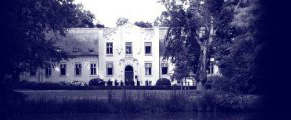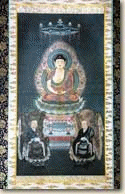
The spiritual line of the transmission of the Dharma, the living pulsation of the ungraspable reality, begins with the historical Buddha Shakyamuni, carried on through Bodhidharma and Daikan Eno to Dogen Zenji and Keizan Zenji all the way up to present times.
Dogen Zenji (1200-1253) and Keizan Zenji (1268-1325), the founders of the Japanese Soto-Zen, were two of the most outstanding religious characters of their times. The practicing of Shikantaza/Zazen is the essence of their teaching and their spirit, as it has been transmitted.
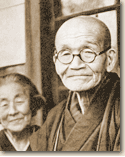
Sawaki Kodo Roshi (1880-1965) was one of the most important Zen-masters of the twentieth century. Being a major reformer, he restored Zen to its original freshness and simplicity of “Zazen itself”.
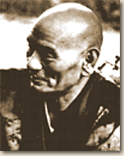
Deshimaru Taisen Roshi (1914-1982) was a disciple of Sawaki Roshi for about 30 years. He arrived in Europe in 1967, where he began to teach the practicing of Zen: Zazen. Many people became his disciples, and more than 100 Dojos were founded by him, like e.g. the Zen Dojo Berlin Shôgôzan Zenkôji.
Because of his unique and impressing personality, Deshimaru Roshi was also called The Bodhidharma of Modern Times.
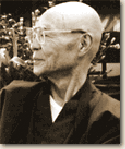
Narita Shuyu Roshi (1914-2004) was a fellow-disciple of Deshimaru Roshi, and he too practiced for about 30 years with Sawaki Roshi. He was the first to receive the transmission of the Dharma (Shiho/Denpo) from him. Narita Roshi was the abbot of the Todenji-temple in the northern regions of Japan, and he supported Deshimaru Roshis mission in the Japanese Soto-Zen. Furthermore, Narita Roshi is honorary-founder of Mokushôzan Jakkôji, the Zen-center in Schönböken.
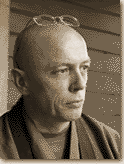
L. Tenryu Tenbreul, born in 1956, began to practice zazen in 1975. He concentrated on studying and practicing with Deshimaru Roshi from 1977 to 1982. In 1978, he was ordained a monk by Deshimaru Roshi and founded the Dojo Mokusho-Do in Münster on his behalf, which he directed until 1986. After his teachers’ death, he continued his studies as a disciple of Narita Roshi, from whom he received shiho/denpo, the transmission of the dharma, in 1986.
L. Tenryu is president of the incorporated society “Zen-Vereinigung Deutschland e.V.” (Zen Association Germany) since 1983, founder and abbot of the Zen-Center Mokushôzan Jakkôji in Schönböken, and head of the Zen Dojo Shôgôzan Zenkôji in Berlin since 1986. Since 1993, he has been Dendokyoshi (approved teacher of the Japanese Soto-Zen school).
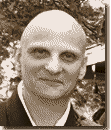
M. Shudo Andre, born in 1953. Since 1978 Zazen. From 1979 disciple of Master Deshimaru. Bodhisattva ordination from Deshimaru Roshi 1979. 1979 Head of the Zen-Dojo Ryumon in Hamburg. After the dead of Deshimaru Roshi 1982, disciple of L. Tenryu. 1986 Monks ordination from L. Tenryu. In 2003 Dharma transmission from L. Tenryu. Since 2004 Dendokyoshi Jakkôji.
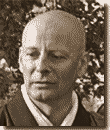
Th. Kairyu Quitschau, born in 1955. Since 1978 Zazen. From 1979 disciple of Deshimaru Roshi. 1981 Monks ordination from Deshimaru Roshi. 1981 founder and head of Zen-Dojo Gyojin Lübeck until 2000. After the dead of Master Deshimaru Schüler disciple of L. Tenryu. In 2003 Dharma transmission from L. Tenryu. Since 2004 Dendokyoshi Jakkôji.
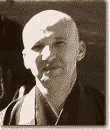
A. Seiho Woller, born in 1952. Since 1978 Zazen. From 1980 until 1982 disciple of Deshimaru Roshi. After the dead of Master Deshimaru disciple of L. Tenryu. 1987 Monks ordination from L. Tenryu. From 1986 head of Zen-Dojo Mokusho-Do in Münster. In 2003 Dharma transmission from L. Tenryu. Since 2004 Dendokyoshi Jakkôji.
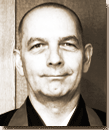
B. Dokan Haverkamp, born 1959. Disciple of L. Tenryu for more than 30 years: Zazen practice since 1983. Ordination as monk 1986. He contributed considerably to the build-up of the Sangha, in the beginning in Dojo Münster, later in Dojo Berlin, e.g. as Tenzo for the first Sesshin at Westerwald, during the installation of the Zen-Center Schönböken and in other essential responsibilities. Dharma transmission by L. Tenryu in 2015.


